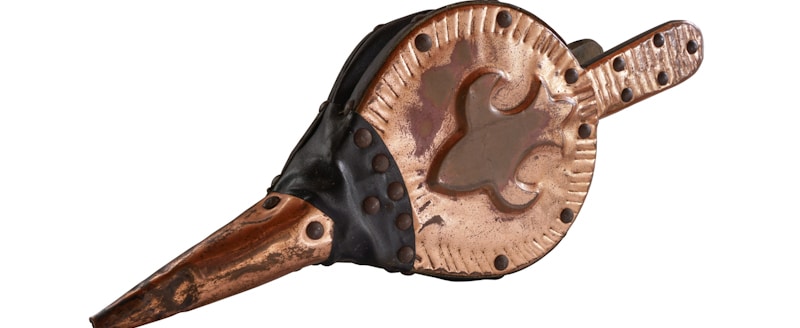In English, a slight spelling difference can change the meaning of a word and the sentence it’s being used in. Auto spell-checkers and diligent proofreading can be of help. But when the two words are valid English terms, such as “bellow” and “below”, the software tool won’t be of much help, and even manual intervention may fail to detect the issue.
The term “bellow” means to “give a roar”; and “below” means “something under” or beneath a level that’s considered “standard” or “average”. Associate the word “bellow” with a bell to remember its meaning and use it correctly. “Below” is quite a common word and, therefore, not tough to remember.
Not to mention, “bellow” is a noun, and “below” is a preposition and/or an adverb. Keep reading to learn in a bit more detail what “below” and “bellow” means, how the two words are used in sentences, how to not confuse between the two terms, etc.

“Bellow” – Definition
The noun “bellow” literally means an animal’s roar or any similar noise. When used as a verb, it means “making a deep, loud, hollow noise akin to an angry bull’s roar”. A “bellow” is usually out of “fear” or “surprise” than “anger”. However, there are exceptions to this rule.
Synonyms of the word are “call”, “yowl”, “shout”, “emit”, “holler”, “clamor”, “yell”, “yawp”, “scream”, “shriek”, etc. The word “bellow” or “bellows” could mean a few other things too, such as a device that’s used to air-blast things in factories or workshops.
Though not well-documented, it’s believed the word “bellow” is derived from the Old English term “bylgian” and the Middle English word “belwen”. The word is also quite similar in spelling and sound to “bellan”, a term linked with Old High German and Old English.
“Below” – Definition
Used as a preposition or an adverb, the word “below” denotes the position of a thing. It indicates the lower placement of a particular thing in relation to another thing – an object or person, for instance. Synonyms of the word “below” include “beneath”, “infra”, “under”, etc.
Besides indicating specific positioning, the word could also imply “less” or be used in contexts where the word denotes being beneath a certain standard or average. When used in that context, the word is interpreted as a crude remark or an insult.
Using the Words “Bellow” and “Below” in Writings
The word “bellow” is used in sentences as an “intransitive verb” or a “transitive verb”. When used as an intransitive verb, the verb means an actual animal’s roar. For example:
- The dog bellowed its displeasure at the gopher who was busy eating from the hummingbird feeder.
However, when used as an intransitive verb, it denotes the behavior of humans or takes a metaphorical avatar. In the sentences below, the word “bellow” doesn’t mean the roar of an angry or aggrieved animal:
- The angry shopkeeper bellowed at the thief.
- The grumpy old man bellowed the kids to get off his lawn.
- The kid bellowed loudly in protestation while exiting the play area.
The first two sentences above also denote “bellow” does not always stem from “fear” or “surprise”.
Since “bellow” is also a noun, the word can be an individual’s name. For example:
- It’s been close to a decade, and Bellow has still not managed to close his student loan.
The word “Bellows” can also be a surname, as in “Brian Bellows” or “Albert Fitch Bellows”.
As mentioned above, “bellows” could also mean an industrial tool. Here is a sentence using the word “bellows” as a piece of equipment:
- The foot-operated bellows that were used to smelt metal in ancient Japan were called “Tatara”.

The term “bellow” can also be used as a phrasal verb, such as “bellow out”.
Also, “bellow” is considered to have a masculine undertone. The word is, therefore, most likely to be used in reference to male animals or men. However, this implication is not a strictly followed rule, and females can also “bellow”.
Using the Word “Below” in Sentences
Compared to “bellow”, the term “below” is considerably more versatile. As mentioned above, “below” is used in texts when the low-lying positioning or status of something needs to be pointed out. For example:
- Kindly read the below text.
Here are a couple of sentences illustrating how “below” is used to denote something being lesser than what’s considered “average” or “regular”:
- His salary has always been below what other employees were paid on average.
- Sarah is still below Stacy at work and is unlikely to be considered for the senior editor position.
In the second sentence above, “below” denotes a lower hierarchic positioning.
When “below” is used as a preposition, it invariably is followed by a noun, making for a prepositional phrase.
Expressions with the Word “Below”
The term “below” is a part of quite a few commonly used expressions. The following are some of them, with their meanings:
- “To hit below the belt”: The phrase implies “wrong” or “not being fair”. To ridicule people’s appearance or personal attributes they cannot change is “hitting below the belt”.
- “Below average”: It means “bad” or “beneath ordinariness”. If you are in school and “below average” in science, you need help in the form of a tutor. The phrase “below average” is usually hyphenated, as in “below-average”. But it could also be used without the hyphen.
- “Below someone”: The phrase denotes “being lesser in social status or rank than another individual”. The expression is also used when you want to indicate something is below your standards. For example, “I would never seek employment in that company. Its business ideals are below me.” Not to mention, this expression is outright rude if it’s used in direct relation to another person.
Not Getting Confused Between “Bellow” and “Below”
Unsurprisingly, getting confused between the terms “bellow” and “below” is not that far-fetched. Most writers use “bellow” instead of “below”, or vice versa because they get the meanings of the words wrong. There are also instances when, due to the two terms’ very similar spellings, a typo could have caused the error.
Here are a few expressions that could cause this confusion:
- “Let out a below”; and “let out a bellow” (correct)
- “Bellow of rage” (correct); and “below of rage”
- “Bellow like a bull” (correct); and “below like a bull”
If you’re having trouble distinguishing between the two words, remember “bellow” begins with the word “bell”, which can also create a loud noise. Also, the double “L” could be viewed as signifying a bull’s horns, which could be linked to the word’s meaning. Not to mention, both “bell” and “bull” have the letter “L” used twice in them.
Like “bellow”, “yell”, too, has a double “L” in its spelling. Use this piece of mnemonic information to remember the word’s correct meaning and spelling while writing.
Not to mention, the word “bellow” rhymes with the word “yellow”. Knowing how the word sounds when pronounced will ensure you do not confuse the word for “below” when it’s used in conversations.
The word “below”, on the other hand, can be split as “be-low”, which should help remember its meaning and spellings. Compared to each other, the word “below” is a lot more commonly used – almost 300 times more.
Example Sentences with the Word “Bellow”
Here is a list of sentences incorporating the word “bellow”, both as a noun and as a verb:
- The knife cut through bone and flesh in one seamless motion, causing his bellow to turn into a scream.
- She bellowed her instructions across the room.
- She bellowed at him to come over.
- The furious bellow of the storm was scary.
- I heard someone bellowing in the distance.
- The lion’s bellow indicated the animal was in some severe pain.
- A library is a place where you are certainly not allowed to bellow.
- People presumed him to be an angry person as he could always be seen bellowing at someone or the other.
Example Sentences with the Word “Below”
Here are sentences incorporating the term “below”:
- The gorge was 700 feet below the railway bridge, with no downward path.
- The light is visible from down below.
- It is two degrees below zero in my place.
- Mary has a mole right below her left elbow joint.
- He is below derision.
- His contributions to the project were below-average.
- Kindly leave your thoughts in the comments section below.
- The temperature has fallen below 0 degrees.
- Kate lives below Tom.
- Her marks this term were below-average.
- The socket wrench was on the shelf right below the other wrenches.
- Stow the wealth below.
- The cat was sitting below the tree, watching for birds.
- She was looking up at the stars and the moon from down below.
- The company’s earnings in the past quarter were below expectations.
- It’s heart-breaking to see all the spilled food below the table.
Conclusion
Among various similar-sounding and spelling words in English, “bellow” and “below” are close to being identical. However, they mean entirely different things, and it’s imperative not to use them interchangeably. If you know what the individual words mean or remember which word stands for what, getting mixed up between the two words is highly improbable.
Shawn Manaher is the founder and CEO of The Content Authority. He’s one part content manager, one part writing ninja organizer, and two parts leader of top content creators. You don’t even want to know what he calls pancakes.


